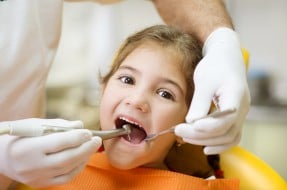Call now on0800 051 8069
The child dental health ‘crisis’ and tooth extractions on children
-
A blog reviewing the concerning number of tooth extractions carried out on children per year and the potential causes of this.
Data suggests that more than 160 operations to remove multiple teeth from children were carried out every working day in England last year. Figures were analysed by the Local Government Association, who found that there were 40,800 hospital operations to remove teeth in under 18s, usually as a result of tooth decay. This represented a 10.7% rise in such procedures since 2012-13, costing more than £35.6 million.
Why is this number so high?
The cause of this high number of extractions has been attributed to several different factors, one of these being poor diet. In particular, concerns have been raised that many children are drinking fizzy and sugary drinks far too frequently. Research carried out as part of National Smile Month 2016 found that in England, children and young people drink sugary soft drinks more often than anywhere else in Europe. As such, support is increasing for the sugar tax on soft drinks that is due to be introduced in April 2018. Representatives of the Local Government Association, the British Dental Association and the Faculty of Dental Surgery of the Royal College of Surgeons have called for a speedy introduction of this tax in light of this.
There has also been a call for increased government support for public health campaigns aimed at reminding parents of the importance of their child’s oral health, as the number of extractions carried out on children has been part attributed to poor oral hygiene. It has been argued by Mick Armstrong, Chairman of the British Dental Association, that the Government has remained disinterested in oral health despite the current ‘dental crisis’ in the UK, which has seen NHS resources poured into surgery and restorative treatment, whilst no preventative education has been provided.
Absent Dentistry
In addition to the above two points, it was argued by Ollie Jupes (a pseudonym of a dentist who has practiced in the NHS for 25 years) that the UK is struggling as a result of ‘absent dentistry’, relating to a deficiency of appropriate primary dental care.
In 2006, a new system of targets was introduced for general dental practitioners in the UK, replacing the previous ‘payment fee-per-item of treatment’ scheme. Under the new system, dentists are required to carry out a specified number of units of dental activity per year. Critics have suggested that dentists have struggled to meet these targets, meaning that they are unable to maintain their average income.
As a result, it has been proposed that dentists are too focused on meeting targets and are unable to spend an adequate amount of time treating individual patients and giving prevention advice. This has particularly affected the treatment that children receive as their teeth are difficult to treat. Deciduous (baby) teeth have thin coatings of enamel meaning that they are prone to decay if a child has a poor diet or oral hygiene and treatment often takes longer for a child than it would for an adult.
Summary
Therefore, it has been concluded that a combination of poor diet, poor oral hygiene and ‘absent dentistry’ has resulted in an increase in the number of tooth extractions carried out on children per year.
It is vital that children’s oral health remains a priority for parents and the Government. Children should regularly visit the dentist and excellent oral hygiene routines should be followed.
However, if you feel that your child’s dental treatment from a practitioner has been substandard, it is beneficial to obtain advice from a specialist dental negligence lawyer, such as those in our Dental Negligence Team. Please feel free to contact us if you wish to discuss a potential claim.







